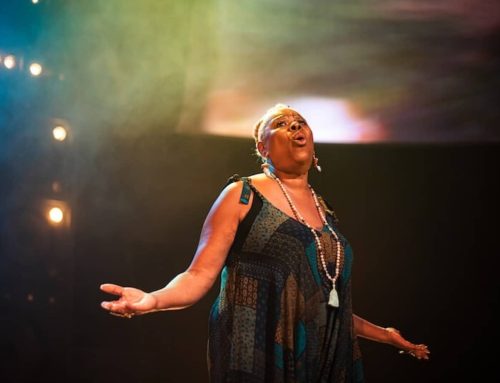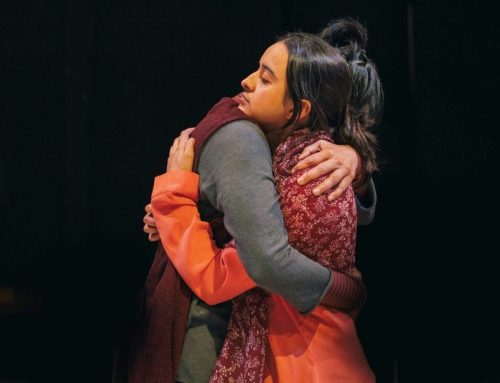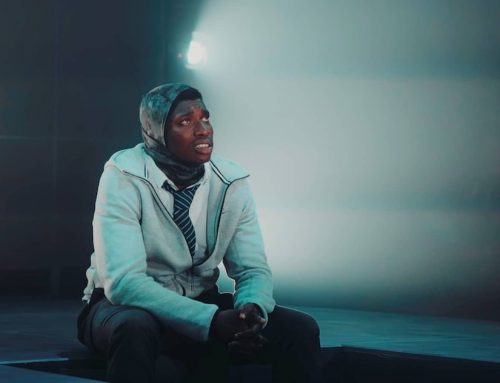That Is Not Who I Am is a partially-successful exploration of how the internet conspiracy theories can overwhelm seemingly normal lives.
17 June 2022
This Is Not Who I am is not, as the Royal Court’s disingenuous website blurb would have it, a new play by an unknown author. It is actually a new play by a well-known writer which explores why seemingly normal people (presumably including visitors to theatre websites) believe what they see on the internet.
It is difficult to describe the play without revealing some of what goes on, so if you are averse to spoilers look away now.
Noah Quilter, played by an engaging Jake Davies, is an endearingly lippy and unrooted ex-serviceman with a propensity to say quite a lot of weird things, some of which he may even believe.
As the name suggests, Quilter can stitch together odds and ends of Facebook ‘facts’ into substantial but not consistently credible tapestries of fiction, which describe in complex detail what he thinks is happening in the world.
We first meet Noah on a newspaper-arranged date with attractive nurse Celeste, played with sparky aplomb by Adult Material’s Siena Kelly. The couple click over cocktails and a shared distain for snobby waiters.
Celeste finds some of Noah’s stranger comedic tales (such as sharing schooldays with Harry and William or having his penis shot off in Afghanistan) a trifle baffling, but it does not stop her from falling heavily for the squaddie.
The pair move in together, eventually becoming one of those self-contained couples that only really seem comfortable in each other’s company. Noah cannot stick at a job, so occupies his days with his infant daughter, odd turns as an electrician, and with growing a huge Facebook following through the production of increasingly barmy conspiracy videos.
Noah’s magnum opus, a grandly named video called ‘State of Awake’, features the beheading of animated versions of big-business oligarchs, including Jeff Bezos and Richard Branson. The violence is not real, but I suppose, for the suspiciously-minded, it is the kind of thing that might attract the attention of the security services. MI5 might, I suppose, implant an agent posing as the next-door neighbour, who might engineer a fake burglary to relieve the couple of their expensive video-making equipment. It is with this fine line between might be and is that the plays concerns itself.
Celeste, meanwhile, exhausted from nursing pandemic victims, gives up her job. The couple soon comes to suffer the Covid lockdown isolation anxiety many of us experienced, their only company being each other and their legions of internet followers.
In the echo-chamber that Noah and Celeste’s life becomes, something has to give. The couple spiral down into total isolation, separated from family and even, ultimately, the internet itself.
There is not a huge amount of tension here, as it is pretty clear from the outset that things are not going to work out well for the couple. But the narrative denouement provides a sober, thoughtful, and reasonably credible counterpoint to the light-heartedness of the play’s opening scenes.
Lucy Kirkwood’s writes good dialogue and there is plenty of comic light and shade throughout. The conspiracist’s psychological need for answers, almost at any cost, comes through with clarity.
The writer also gets the weird mix of the rational and the absurd that characterises conspiracists’ thinking, spot on. Noah, having unveiled his own frankly nutty ideas about global political elites to the entire internet, chides Celeste for suggesting HIV can be treated by yoga. “Don’t be stupid,” he says, “It is a virus… you can’t cure it with the dog position.”
The play has something to say about why some people, when faced with the sheer unpredictability of everything, find modern life so terrifying. Their response is to take refuge in ideas that, though absurd, are comforting in their certainly.
If Kirkwood had restricted her musings to the all-to-predictable demise of two sad misfits, This Is Not Who I am might have ended up a better play.
Instead, Kirkwood adds another layer of complexity to the piece by placing herself (played by a suitably manic Priyanga Burford) on stage, alongside the characters.
Partly this is a tool to facilitate narration. But mainly, I suppose, the idea is to invite the audience to become confederates in creating a conspiracy about the characters she herself has written. We are asked to become accomplices in the fantastic idea that what happens to the imaginary Quilters is part of some larger plot by nefarious government actors. In doing so we are asked to reflect on what it would take for us, supposedly reasonable observers, to be convinced of exactly the same type of fabrications as her characters.
This kind of metatheatrical device – presenting the writer as an onstage promoter of the type of conspiracy she is simultaneously debunking in her narrative – is a nice conceit, and certainly shows ambition.
Kirkwood, unfortunately, does not quite pull it off. Any answer to the question she poses is obfuscated by the clumsiness of the writer’s onstage attempts to mimic the ephemera of real-life conspiracy theories. Rather than enticing us to join in with her fictional journey, the half-comic and half-serious ‘revelations’ of the onstage writer end up being both baffling and disengaging.
Designer Naomi Dawson’s excellent revolving set reveals much that is normally hidden in theatre productions. For example, we see the stagehands going about their business, almost as if they were actors in the piece. It is great at evoking a paranoid picture of a couple permanently on display, and whose lives are apparently impacted by the malignant force of unseen hands.
Narrative denouement aside, the final ending of the play is likely to leave a few heads scratching. Overall, I was not convinced, although I have to admit I did Google Noah and Celeste after the show. Perhaps Kirkwood has sown a seed of conspiratorial doubt in my mind after all.
Jake Davies Noah
Siena Kelly Celeste
Priyanga Burford The writer
Director Lucy Morrison
Writer Lucy Kirkwood
Designer Naomi Dawson
1 hour 50 minutes. No interval.
Full Disclosure: I paid full box-office price for the ticket.
More Recent Reviews
Playfight. Soho Theatre.
Writer Julia Grogan’s breathtakingly assured debut play arrives at Soho Theatre following stellar reviews at the Edinburgh Fringe and [...]
All The Happy Things. Soho Theatre.
Naomi Denny’s three-hander comedy-drama All The Happy Things covers familiar themes within a recognisable premise. A grieving protagonist comes [...]
Telly. Bread and Roses Theatre.
The challenge with absurdist comedy is that many people do not find it funny. Laughing at the sheer weirdness [...]





